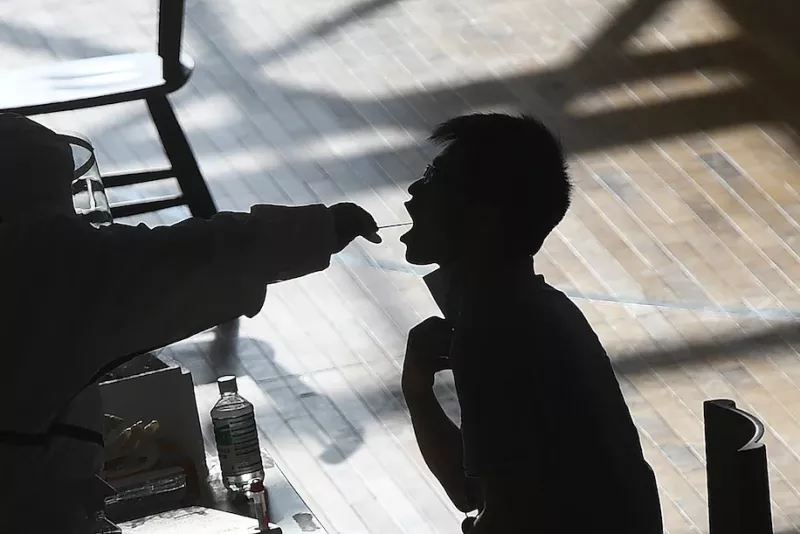
After three months of waiting, the U.S. intelligence community’s review on the origins of covid-19, a summary of which was released last week, produced no detectable insight into how the pandemic started. That means we are no closer to solving this mystery, which is crucial to preventing the next pandemic. What will the Biden White House do next to advance the investigation? Seems like not much.
Hopes were high in May, when President Biden personally declared he was instructing U.S. intel agencies to “redouble their efforts” to determine what happened in Wuhan in late 2019. At that time, the intel community was divided — but largely in the dark — on whether the SARS-Cov-2 coronavirus outbreak occurred naturally or was in some way linked to the labs in Wuhan known for their risky research on bat coronaviruses. Now, looking at the unclassified summary of the intelligence community’s report to Biden, which was released Aug. 27, it appears the review was largely a waste of precious time.
Now, the summary says, four intelligence community elements believe “with low confidence”, the outbreak occurred naturally, up from two in May. One agency still maintains, “with moderate confidence”, that a lab accident was to blame. We don’t know which agency arrived at this assessment — the FBI, perhaps, or maybe the Defense Intelligence Agency? It doesn’t matter. The bottom line is, our spies have no idea what happened in Wuhan.
According to several officials and lawmakers I talked to, the review was doomed to fail from the start. There was a limited scope and a tight deadline. According to reports, the intelligence community hadn’t even started analyzing huge amounts of its own data on the Wuhan labs when the review began. Then, when they finally began poring over what they had collected, they realized they didn’t have enough analysts trained to understand the highly technical, mostly Chinese-language information.
“Ninety days was not enough time to break new ground”, Sen. Marco Rubio (R-Fla.), the ranking Republican on the Senate Intelligence Committee, told me. “The intelligence community must keep pursuing new avenues of inquiry until sufficient evidence is gathered to draw a satisfying conclusion. … The American people deserve the truth about how this virus emerged, which this assessment did not provide”.
A senior administration official told me that the intelligence community’s work continues and that “U.S. government technical experts” have asked their Chinese counterparts for several categories of information, including data, virus samples and genetic sequence information from the earliest cases; samples taken from food markets in Wuhan; and information about the Wuhan Institute of Virology, and illnesses of researchers there in late 2019. The summary itself says the intelligence community will be “unable to provide a more definitive explanation” unless more information comes to light, essentially conceding defeat.
“The [People’s Republic of China] continues to obfuscate and deny, which is irresponsible in global health and dangerous for humanity”, the official said, pointing to calls for China to cooperate with the World Health Organization’s “Phase 2” investigation, which Beijing has already rejected. Administration officials privately admit the WHO has no leverage and that its first effort was fatally flawed.
On Capitol Hill, there’s broad disappointment with the intel review. In some quarters there’s also deep suspicion that both the intel community and the Biden White House are trying to check the box, cursorily blame the Chinese government for obfuscation and sweep the issue under the rug.
To that point, the intel summary’s claim that “China’s cooperation” would be needed to conclusively determine the origins of the pandemic is a “cop-out”, Rep. Mike Gallagher (R-Wis.) said in a statement.
“We do not need to wait for China’s cooperation to advance our understanding of the origin of the pandemic”, said Gallagher. “What we cannot do is throw up our hands and shrug at more than 600,000 dead Americans”.
In his statement Aug. 27, Biden pledged his administration “will not rest” and “will do everything we can to trace the roots of this outbreak that has caused so much pain and death around the world”. Besides punting to the WHO, the administration is offering no specifics on how it plans to back up those words.
There’s no shortage of ideas out there. Lawmakers are calling on Biden to sanction the labs that won’t cooperate, to release more of the intelligence the United States holds about the Wuhan labs, and to tell his own agencies — including the National Institutes of Health and the National Institute of Allergy and Infectious Diseases — to stop ignoring GOP requests for their records of their collaborations on coronaviruses in China. If Democrats are serious when they say they care about this issue, they should join the Republicans in calling for these things now.
The intel summary bizarrely concluded that Beijing’s stonewalling is due to the Chinese Communist Party’s “own uncertainty about where an investigation could lead as well as its frustration [that] the international community is using the issue to exert political pressure on China”. But that’s the Chinese Communist Party’s propaganda, not its real concern. China’s actions show that its real fear is that the world might actually discover what it has been covering up — the truth.
Josh Rogin is a columnist for the Global Opinions section of The Washington Post. He writes about foreign policy and national security. Rogin is also a political analyst for CNN. He previously worked for Bloomberg View, the Daily Beast, Foreign Policy, Congressional Quarterly, Federal Computer Week and Japan's Asahi Shimbun newspaper.
